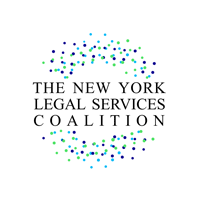NYLSC’s testimony to the Chief Judge’s 2023 hearing on Civil Legal Services:
Pay Equity for Advocates Serving Historically Disadvantaged Communities
This testimony is respectfully submitted on behalf of the New York Legal Services Coalition (NYLSC). Our Coalition consists of almost 50 member organizations providing vital legal services in every Judicial District of the State of New York.
Low-income families who cannot afford to hire a lawyer rely on our agencies to provide effective and compassionate legal services when facing domestic violence, loss of income, housing instability, child support/custody disputes, or lack of immigration status. Our clients are disproportionately BIPOC and have been systematically denied equal access to justice. In addition to their specific legal problems, our clients also face the additional challenge of navigating a legal system which disadvantages individuals who lack equal resources to hire legal counsel. At a structural level, the system will continue to perpetuate this inequity unless and until it is addressed.
Our organizations have struggled to keep pace with exponentially increasing client needs despite almost exclusively flat funding. To better understand the scope of the problem, our Coalition conducted a survey of our members across the state. Preliminary data indicates that civil legal services attorneys earn approximately 20-75% less than their counterparts working directly for the government.
For example, in New York City, the average salary for a first-year civil legal services attorney is $69,000. In contrast, the starting salary for an attorney at the Office of the Attorney General’s (OAG) office in NYC is $90,000. The contrast is even starker in the rest of the state, where OAG attorneys earn at least $87,000 to start, while the highest starting salary for a legal services attorney outside of NYC or the Hudson Valley is approximately $59,000. The disparity in pay only increases over time. An upstate attorney with 10 years of experience working for the OAG is paid an annual salary of $131,000. The same attorney being paid by the government under a legal services contract would earn approximately $74,000.
This extreme pay disparity impacts vital services for those who need them the most. Legal services organizations cannot compete in the present market for legal talent. Our organizations lose much of their top talent to municipal and state government employers, who also offer competitive health and retirement benefits packages as well as access to public interest loan forgiveness. Legal service attorney positions remain open for months with no qualified applicants willing to accept the market rate. As a result, organizations are not able to meet the needs of local litigants and community members are left to navigate the courts without the benefit of legal assistance.
Like most issues of structural inequity that may be observed in our system of government, this disparity is neither the result of an individual decision, nor can it be dismantled with a single-approach solution. Instead, those of us committed to equal justice must collectively address the issue and work together to close this “justice gap” in a way that does not further exacerbate the problem.
We look forward to engaging all three branches of the government in finding a solution. The Chief Judge’s leadership is greatly needed to engage the Governor and legislators in addressing pay equity at a systemic level. A commitment to equity requires increased resources to sustain and enhance legal services for communities who have been historically disadvantaged.
Respectfully Submitted,
New York Legal Services Coalition (NYLSC)
By: Tina M. Foster, President
The New York Legal Services Coalition’s June, 2023 Statement in Support of Recent Arrivals:
“The Constitution protects the right of all people in the United States to travel wherever they choose to go, and people who have crossed the southern border have come to every state and a wide range of communities. We all have a duty to welcome those fleeing persecution and deprivation, and the Governor should use her executive power to prevent grandstanding local officials from attempting to block these efforts with racist and illegal proclamations and frivolous litigation.”
